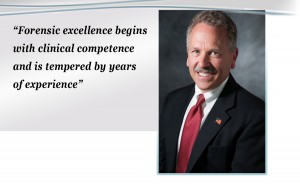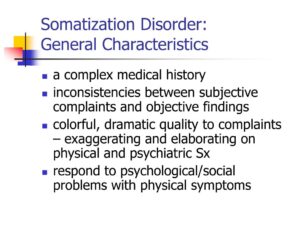■ Ask The Experts Questions: Somatization Disorder

Neil S. Kaye M.D. is an active clinician and expert witness. As a specialist in Forensic Psychiatry, his testimony has had a major impact in high profile cases.
- In his report, the opposing expert, a renown academic who does almost exclusively defense work, accused me of simply signing a report authored by the attorney who hired What is the appropriate response?
-

Somatization Disorder Characteristics. : A complex medical history. inconsistencies between subjective complaints and objective findings Colorful, dramatic quality to complaints – exaggerating and elaborating on physical and psychiatric Sx. Respond to psychological/social problems with physical symptoms
In a difficult workers comp case where the claimant alleged a toxic gas exposure, all experts on both sides agreed that the diagnosis was somatization disorder, and that there was no evidence of a toxic encephalopathy or exposure. Nonetheless, the accident board ruled that exposure had occurred and that the claimant had a toxic encephalopathy and PTSD from the The defense appealed and the court ruled that as a matter of law, the decision of the accident board could not be over-ruled (legal precedent, even though they too felt no exposure occurred). The case is now coming back to the board and I am trying to figure out what to do. As a matter of law, I have to presume that claimant had a real exposure and thus can’t have somatization disorder, despite my prior opinion (bolstered by opposing witnesses/treaters) of the correct/real diagnosis. How should I proceed?
Neil, both good questions. To the first, I would say the appropriate response depends on the extent to which the accusation has merit or not merit. Does this attorney have a reputation for writing his experts’ reports? If so, keep away not to be tainted by the accuser’s broad brush. If there is no merit whatsoever to the charge, wonder if the accuser is projecting his own folly onto his adversary. There is no place for that kind of meanness in our work if there is no basis for the charge. Did he make the charge in court? in writing? or privately? The response depends on the venue of the accusation. If in open court, demand an explanation and evidence to support such a charge or demand an apology for becoming adversarial when we experts should be neutral or at least strive for neutrality according to AAPL ethical guidelines. We can disagree without becoming disagreeable.
Re the second question, the response is simple: There is no need to recant your scientific opinion in the face of a legal determination not based on science. Both adversaries agree that there is somatization, not PTSD. On appeal, the case has come back but there is no need to recant. Give the same opinion even in the face of the legal determination or recuse yourself from the case. No need to be frustrated or angry to tell the IAB and the Court off to show they are wrong. You are an expert who has education and training hey do not have and are there to advise not to call names or criticize. Give them your best advice based on scientific knowledge and leave. They may or may not accept your opinions. Legal decisions are based on many factors, including political, individual and other biases over which we have no control. Thank goodness our forefathers thought to institute an appeals system that can overcome many of the inherent biases seen in lower court decisions. We do not make the rules but must adhere to them as we visit their chambers and courtrooms. We may also help to change rules when appropriate but not in the courtroom when we testify. Changes come through legislation or by appellate decisions.
Neil these responses are off the top of my head. I will see you in AZ as I will arrive on Wed. PM and introduce Steve Billick as our new president on Thurs. AM